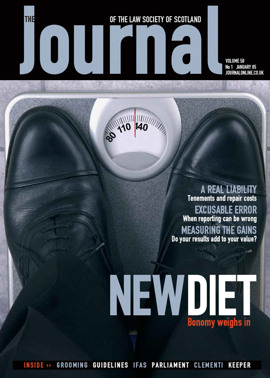Riding the wave of change
I had a mild but nonetheless shocking revelation at the litigation division Christmas night out. I should have been prepared, of course – past years of astonishment at the weird and wonderful drinks selected by younger members of staff were the straws in the wind. But no, I realised – sorry, it was pointed out to me – that I was the third oldest person there, and a partner before many of the solicitors had left school. I won’t repeat the horror of the number who weren’t even born when Slade first sang “Merry Christmas Everybody.” In the cold light of the column one can say that this is an unsurprising feature of the demographics of the profession.
Highlight of the month for me was the House of Lords, sitting as a bench of nine, ruling against Mr Blunkett’s anti-terrorism legislation allowing the detention of non-UK nationals without trial – exemplifying the place of the justice system and lawyers in a democratic country as a much-needed check on executive power. A much more important and valuable contribution to democracy than the Home Secretary being forced to resign on the back of a media feeding frenzy around his personal life and injudicious comments about his Cabinet colleagues.
It is amazing how time flies, especially when you are President. December saw Council elect Ruthven Gemmell, a partner in Murray Beith Murray, as Vice President Elect. I am sure Caroline Flanagan and he will make an admirable team in taking matters forward when they take up their new offices in May.
<>By the time you are reading this the Scottish Executive will probably have laid the regulations to increase the maximum compensation for IPS to £5,000. The Society has for a long time supported an updating of the maximum, which has remained at £1,000 since it was introduced. We have reservations about the level of increase, as it is difficult to see what level of inconvenience one has to sustain in order to receive an award of £5,000. The Executive appreciates that this is not intended to result in a fivefold increase in awards but rather to permit higher compensation in the most serious cases. We must seek to manage expectations, or the great strides forward which we are making in improving our systems for dealing with consumer complaints may be brought into disrepute. We have in hand the preparation of guidance on compensation which we believe will be helpful to the profession and the public in dealing with complaints. We should however be in no doubt that the disastrous handling and failings of the complaints system south of the border played a major part in the Clementi process and also his conclusions. That the Society can demonstrate we deal efficiently and effectively with consumer complaints will do much to reinforce the distinction between our legal regimes and the need for Scottish solutions to Scottish problems.I see 2005 as a year full of challenge for solicitors. Our efforts to promote our firms as they increasingly seek to compete south of the border serve to demonstrate that we are not parochial but, as the Royal Bank of Scotland were reputed to have identified from their market research, that the Scotland “brand” does carry a value there.
We do seem to be even more under the cosh than usual at the moment, and facing an avalanche of consultations, reviews and new initiatives, including the Scottish Executive research working party into the legal services markets, the Executive’s Strategic Review on Legal Aid and the follow-up to the Justice 1 Committee inquiry into regulation of the profession, amongst others. As lawyers we are very good at being critical, deconstructing, undermining and challenging. There may be philosophical arguments about whether these are facets of our personalities which encourage us to become lawyers in the first place, or the essential skills with which trainee lawyers are inculcated. In responding to all the forthcoming consultation papers we need to bring all these skills to bear, but also that other most critical skill of lawyers, proposing workable solutions.
A good example of our trying to get on the front foot in this regard was the most successful conference on the Diploma, seeking to engage with all those with an interest to develop and further improve this component of solicitors’ training. My thanks and appreciation go to all who helped to make this such a worthwhile event. Getting back to my age and stage, I am closer to the concept of “education, education, education” as a positive rather than Pink Floyd’s “We don’t need no education”; but then again I didn’t like that when it came out either…
In this issue
- Riding the wave of change
- Last stand for the defence
- Losing the wait
- What right to be wrong?
- Prevention as the cure
- No room for half measures
- Poles apart
- Get IT right
- The value proposition
- A time for resolution
- When it falls, it falls
- Round the houses
- Private bills and public interest
- Charging Peter to pay Paul
- Fair pay for liquidators
- Website reviews
- Book reviews
- Fair notice?
- The new title conditions






